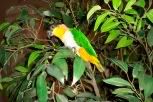One thing I find rather frustrating about keeping caiques in the home is that so little is known about them. We know there are two species and four sub-species. We know they like to reside in the forest canopy of their natural environment. We have a general idea of their range and to which countries they are native to. We think we have an idea of which foods they eat in the wild- over at the Caique Site, John Micmichael has documented a small list of foods that caiques eat in the wild.
But other then that- what do we know? Their sleeping or foraging habits, their nesting habits? Unlike macaws and cockatoos or other parrot species who have been studied extensively in their natural habitats, we know next to nothing about these delightful little birds called caiques. People argue over whether or not to give them sleeping quarters such as a nextbox year round- in countries such as Germany where they are avicultural requirements and minimums, this is a must. Why? What leads us to that conclusion?
When people ask about the specific dietary requirements of caiques, no one can answer honestly, because we don't know. Oh, we can guess about their needs- its been said they need a higher fruit content, perhaps even supplement with nectar like a lori and fresh flowers- but why? What if we are leaving out an important aspect of our birds diet because we have not sought to find the true answer.
People fight all the time for the funds to get to go and observe a species in its natural habitat, log the data and bring that information back to share with the avicultural community in hopes of better understanding our parrots and enriching their lives. Shouldn't we do the same for our caiques? I've donated to yellow eared conure conservation efforts, hyacinth, spix, lears, and blue throat macaw efforts, but have yet to come across a person, group or some such organization that has stood up and said: 'I am fighting for the right of the caique parrot. I want to know more about their habits so that I can make my birds at home happy and healthy and allow them to live out their natural lives.'
Isn't it time?
caiquecrazy Wednesday, September 26, 2007 5 comments
Subscribe to:
Post Comments (RSS)





5 Responses to " "
Very informative! I would (and this is my own opinion) like to see photos of caiques!
There is some helpful information at this site
http://www.caique-parrot-pet-birds.com/
It seems the Caique species is endangered because the rain forest is being destroyed. No one has made the effort to study this species and that is a real loss. The Caiques' future lies with aviculturalists, and from what I read, the popularity of these beautiful birds is growing, so maybe one day, there will be enough bred in captivity to reintroduce them in the wild.
In the photo gallery of this site, there is the cutest photos of a baby caique growing up. They are so incredibly pretty.
I will have photos of these gorgeous birds in my next blog entry :)
I think it is a real loss that people are overlooking these gems and allowing their habitat- and the wild birds, at that- to be destroyed before we start to truly study them. We lose so many possible answers that way.
Slightly OT, but when I first got Calypso (BCH) we took him to an avian vet. Towards the end of the visit (during which we'd been discussing caiques), he took him out of the room and I could overhear a conversation with one of the assistants.
She asked, "What kind of bird is that?"
The avian vet responded, "I don't know, some kind of conure."
Can you believe this? Needless to say, I found a different vet! But the information on them is lacking!
Oops -- typing too fast and not proofreading enough! He is a BHC not some sort of strange BCH (which might make the vet's lack of knowledge more understandable since I have no idea what a BCH would be!)
Post a Comment